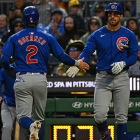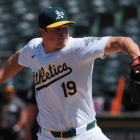Mets right-hander Matt Harvey entered into his Tuesday night start against the division-rival Nationals lugging around an ERA of 5.77 for the season and obviously hoping for better results. Insofar as that goes, well ...

As you can see, Harvey pretty well got knocked around during the course of the Mets' 7-4 loss to Washington (box score). You'll note that paltry strikeout total ...
Harvey's one strikeout tonight was a career-low.
— Matt Ehalt (@MattEhalt) May 25, 2016
And you'll note that updated ERA ...
There are 105 qualified MLB pitchers. Matt Harvey's 6.08 ERA ranks 101st.
— Marc Carig (@MarcCarig) May 25, 2016
Harvey's now allowed 19 runs in his last 13 1/3 innings, which, needless to say, makes for a pretty terrible stretch. Not long in this very space we noted that manager Terry Collins wasn't sure Harvey would still be in the rotation when his next scheduled start came around. That next scheduled start is what you see above, so it's probably safe to assume that Harvey's role moving forward is uncertain at the moment.
As for Harvey, it's not hard to imagine that he's frustrated in the extreme right now ...
I wonder if Matt Harvey will speak to media...oh thanks #MetsTwitterpic.twitter.com/OexYrezBuy
— Lil' Mets Fan (@lilmetsfan) May 25, 2016
That probably won't go over well with the scribes (and possibly not with Harvey's catcher Kevin Plawecki, who surely had to field questions about his battery mate's struggles), but it's certainly a glimpse into Harvey's current state of mind.
More to the point, Harvey's fastball velocity remained down relative to his usual standards on Tuesday night, and that's not the only sign of trouble. Harvey's walk percentage is up, and his strikeout percentage is down sharply. His rate of swinging strikes is down, and he's allowing a higher contact percentage on balls in and out of the strike zone. He's also traded a lot of ground balls for line drives, which is something a pitcher never wants to do. In matters related, lefties are crushing his fastball this season, and the four-seamer is his preferred pitch against the opposite side.
No, Harvey's not this bad -- he's got an extremely elevated batting average on balls in play and his rate of stranding runners is also depressed, and those measures are likely to correct in a pro-Harvey direction moving forward. However, those are serious sources of concern noted above. Maybe it's the lingering effects of working 216 innings (counting the playoffs) in his first season back from Tommy John surgery, maybe it's mechanical in nature, or maybe it's just a run of misfortune. The more the bad starts pile up -- he's made it out of the sixth inning only once this month -- the less likely that latter explanation becomes.






















